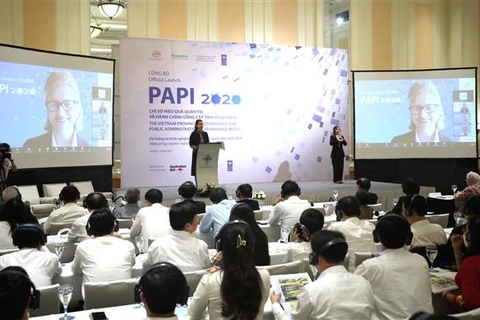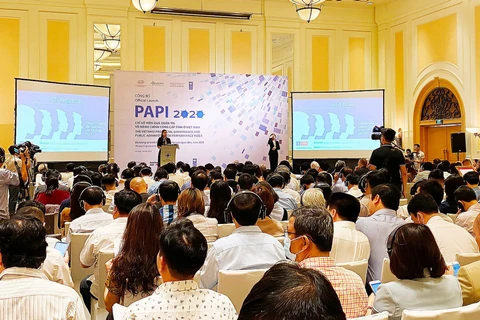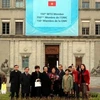Hanoi (VNA) – The 2020 Provincial Open Budget Index (POBI) has the average score of 69.09 out of 100 points, up 3.54 points from the previous year, with the Mekong Delta province of Vinh Long topping the rankings.
Results of the 2020 POBI survey, conducted by the Budget Transparency, Accountability and Participation (BTAP) Alliance, the Vietnam Institute for Economic and Policy Research (VEPR), and the Centre for Development and Integration, were released via an online workshop on June 3.
The survey showed that last year, 27 provincial-level localities fully publicised documents and information about the State budget, three localities more than 2019.
Results of the 2020 POBI survey, conducted by the Budget Transparency, Accountability and Participation (BTAP) Alliance, the Vietnam Institute for Economic and Policy Research (VEPR), and the Centre for Development and Integration, were released via an online workshop on June 3.
The survey showed that last year, 27 provincial-level localities fully publicised documents and information about the State budget, three localities more than 2019.
Meanwhile, those publishing relatively sufficient information numbered 29, up two localities. The numbers of those with insufficient or little information stood at five and two, respectively declining four and one from 2019.
With 93.68 points, Vinh Long tops the 2020 rankings, followed by central Da Nang city (92.26 points) and southern Ba Ria-Vung Tau province (90.45 points). The worst performers are southern Binh Phuoc province (3.84 points) and the Central Highlands province of Dak Lak (23.41 points).
Former VEPR Director Nguyen Duc Thanh, a representative of the research group, said the POBI scores of localities were relatively low in the first years the survey was carried out, with the national average of 30 points, which meant almost no provinces and cities paid attention to budget transparency as regulated in the 2015 Law on State Budget.
However, strong improvements have been seen in the following years when they realised their positions in the rankings, he noted, adding the national POBI average surged to 50 points in 2018 and 65 points in 2019, indicating that localities have been aware of improving their budget transparency.
Though in 2020 - the fourth year of the POBI survey, the improvement of the POBI scores tended to stagnate, many provinces that used to have very low positions recorded considerable improvements while those with high scores and “traditional” budget transparency maintained their stable performance, according to Thanh.
The POBI survey helps localities and central agencies measure the transparency level in the State budget management. It also assists the country to have better financial and fiscal reforms, helping to achieve Goal 16 of the UN Sustainable Development Goals about transparency, accountability, and people’s participation.
The 2020 survey was funded by Oxfam Vietnam and Konrad-Adenauer-Stiftung Vietnam./.
With 93.68 points, Vinh Long tops the 2020 rankings, followed by central Da Nang city (92.26 points) and southern Ba Ria-Vung Tau province (90.45 points). The worst performers are southern Binh Phuoc province (3.84 points) and the Central Highlands province of Dak Lak (23.41 points).
Former VEPR Director Nguyen Duc Thanh, a representative of the research group, said the POBI scores of localities were relatively low in the first years the survey was carried out, with the national average of 30 points, which meant almost no provinces and cities paid attention to budget transparency as regulated in the 2015 Law on State Budget.
However, strong improvements have been seen in the following years when they realised their positions in the rankings, he noted, adding the national POBI average surged to 50 points in 2018 and 65 points in 2019, indicating that localities have been aware of improving their budget transparency.
Though in 2020 - the fourth year of the POBI survey, the improvement of the POBI scores tended to stagnate, many provinces that used to have very low positions recorded considerable improvements while those with high scores and “traditional” budget transparency maintained their stable performance, according to Thanh.
The POBI survey helps localities and central agencies measure the transparency level in the State budget management. It also assists the country to have better financial and fiscal reforms, helping to achieve Goal 16 of the UN Sustainable Development Goals about transparency, accountability, and people’s participation.
The 2020 survey was funded by Oxfam Vietnam and Konrad-Adenauer-Stiftung Vietnam./.
VNA

























